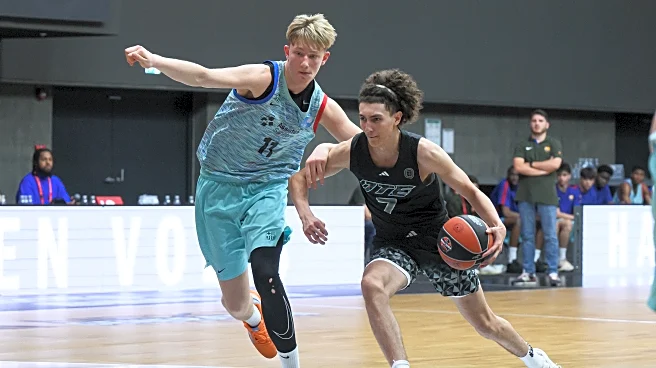What's Happening?
The New York Giants are sticking to their quarterback strategy despite rookie Jaxson Dart's impressive preseason performance. Dart, who was drafted in the first round, showcased his skills by completing 13 consecutive passes and 14 of 16 total against the Jets. Despite this, head coach Brian Daboll confirmed that Russell Wilson remains the starting quarterback, with Dart being developed for future potential. Daboll emphasized the importance of patience and growth, noting that Dart's development is part of a long-term plan. Dart expressed trust in the coaching staff's process, while Wilson, a seasoned player, is committed to mentoring the rookie.
Why It's Important?
The decision to keep Russell Wilson as the starter while developing Jaxson Dart reflects the Giants' strategic approach to building a strong team for the future. This move highlights the importance of nurturing young talent while relying on experienced players to lead the team. The Giants' approach could influence other NFL teams in managing rookie quarterbacks, balancing immediate performance with long-term development. For fans and stakeholders, this strategy promises potential future success while maintaining stability in the present season.
What's Next?
As the regular season approaches, the Giants will continue to focus on Dart's development while Wilson leads the team. The coaching staff will likely monitor Dart's progress closely, adjusting training and game opportunities to enhance his skills. The team's performance in the upcoming season will be crucial in determining the effectiveness of this strategy. Stakeholders, including fans and analysts, will watch closely to see how this approach impacts the Giants' overall success and Dart's future role.
Beyond the Headlines
The Giants' strategy raises questions about the broader implications of quarterback development in the NFL. It highlights the balance between immediate results and long-term planning, a challenge faced by many teams. This approach may influence how teams evaluate and integrate rookie players, potentially shifting the focus towards more strategic development plans. Additionally, it underscores the role of mentorship in professional sports, with experienced players like Wilson playing a crucial part in shaping the next generation of athletes.











